So the question is: can you visit your own youth?
Sure, as long as you can still see it from here. First you need to reassemble the old neighborhood. It’s near the smell center of your brain. Fetch up the mimosa blossoms and the honeysuckle, the sweet humid fragrance of Gifford’s Ice Cream Shoppe, and the taste of rain on a window screen. From there it’s a short hop to the brick Colonials, the split-level “mid-centuries” that used to be called “new,” and a particular rec room and bomb shelter with secrets in them.
Now you’re ready to invite your old friends. You get a core group to loop together the threads of their various connections, add Google and the airline industry, and then your youth–or something like it–will show up one day on a lake in the Adirondacks. Friends Lake, in fact.
It’s not going to be exactly the same. When we were all eighteen or so, there was that fizzy element of infatuation, barely submerged. Not many of us in this socially awkward group knew just what to do with it, but any observer could map it out. All you needed to do was was watch
us unroll our packs in whatever cabin we hiked to and negotiate the space, everyone willing to settle for mere proximity and possibility, the sleeping bags arranging themselves on the floor like iron filings obeying an invisible magnet. That part is pretty much gone now, at least I think it is, our attractions having been diluted into a comfortably low-key group crush.
That first day at Friends Lake was a scene thrumming with joy. Sometimes I stood to the side just to watch as new arrivals showed up and smiles bloomed around the room and laughter rolled in eddies. It was later in the evening that we began to catch up and reconnect in more intimate groups that shimmered and sparked on the deck, a bright constellation of friends.
Unless you’ve grown distracted or inattentive, you’re still in touch with all the ages you’ve ever been. But it’s a special gift to spend time with the people who loved us when we were young and full of the future, who can still make out the eighteen-year-olds at our centers. We have custody of each other’s past. We can set our memories loose to roll around together until they shine again. Until each of us is a polished stone in someone else’s pocket.
Then the week is part of your past too, and the whole thing slides away, and you can watch it go, one hand on your pocketful of stones and one hand on a slim new tether to the last memory.
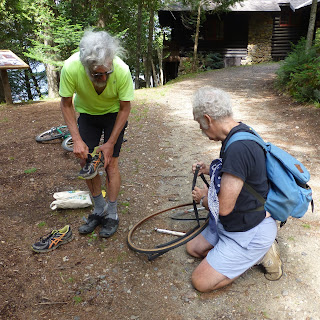 |
| Nothing changes. |
Which, in my case, was that dreamy Bob Gearheart kissed me goodbye.
[On the cheek, Dave.]
[Not that cheek, Dave.]
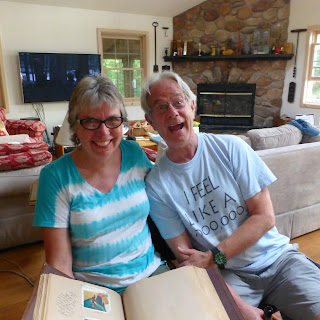
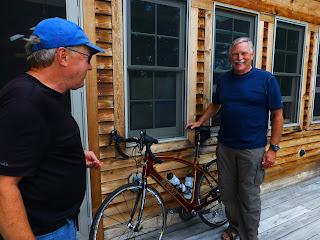
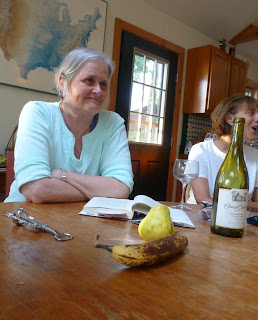
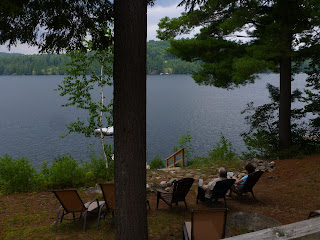
Lucky Bob! (Sorry Dave) I got to dance with Donna at my last get together and I'm not a dancer. Just getting to hold her for a moment put a smile on my face remembering those times back in the last century.
You had to put it THAT way, didn't you.
Terrific series of Old Pharts.
My old Fraternity friends have been having reunions now for 20 years. The first few were all reliving the old college days. Now we relive past reunions. Always fun and lots of laughs either way.
Great description of reliving memories by smells.
I guess the smell center of the brain and the memory box are side by each. Elementary school smells like bananas, soured milk and Lysol.
Simply Brilliant!
You shine, your own self.
Beautiful.
My early memories are less positive, and I have put most of them in the darkest corners of my head, but I loved reading yours.
joeh is nearly right. Elementary school (our primary school) smells of sour milk and vomit. Bananas an optional extra.
Actually, the vomit molecules figure in, also. I'm guessing the janitor made quite an impression on me. In fact, Dave was a grade-school janitor when I met him.
The taste of rain on a window screen is a powerful memory!
You too? Do you suppose we had a mineral imbalance??
I'm guessing spouses didn't attend? That's even more touching, that they trusted all of you. I'm serious.
Sounds like a wonderful time. When's the next one?
Our elementary school smelled like dustbin. For those not as ancient as I am, it's stuff you sprinkle on the floor to keep the dust from flying everywhere while you sweep.
This comment has been removed by the author.
Dustbane, not dustbin, and apparently it was a brand name for the product, or so the internets tells me. I have no idea what the product actually was, just what it was supposed to do.
Well, now, that makes more sense. I don't think I've ever seen/smelled it.
Oh I didn't answer your first question. Mostly, spouses did attend. We have two marriages in the Hostel Club alone, still kickin'. And several of the rest brought their S.O.s. I didn't. Dave and I both sort of feel that reunions are more for the people involved, and it's too hard to keep worrying about if the spouse is having a good time. Plus, yes, we trust!
My old friends are only a few decades old. I envy you the friends of your youth. Thanks for letting us snoop in on your reunion.
My goodness, what did you do with the older ones? Should I ask?
For once, your post made me a little sad, Murr.Because some of my oldies don't want to maintain threads,some have died, some are …god knows where, but Mr.Google doesn't seem to know.
But I am happy for those who do keep the thread intact.I hope I am still a stone wearing away someone's pocket lining…
I have a tiny pebble working for you.
I like to view in my head how I looked at 23. In fact I try to go through life believing I still look that way to everyone and ducking all reflective surfaces. And I refuse to give in!!!
I know what you mean, but I didn't think I looked good at 23, and now I look at the old photos and wonder why. It's all gone now, but I'm happy with the way I Iook. So we are not our best judges, I'm thinking.
Gifford's! Holy moly. There's an ancient memory.
I've heard it's gone now.
I love your memories; I love that you made them so you can write about them for us to read.
I don't go diving into my memory banks often, but there is one youthful free summer I will always remember and don't have to go searching for. The memory is as clear as if it were yesterday, instead of several hundred yesterdays ago.
Hm. Was there a love interest involved?
No. Friendship and freedom.
That Dave has his mind in the gutter.
Well, yeah.
What a great tradition. It's wonderful that your group has stayed connected over time.
Mostly, we didn't. We reconnected. Facebook had a big hand in it. People like to disparage the ol' free social media, but they can get a lot done.
Thank you, your article is very good
viagra asli usa